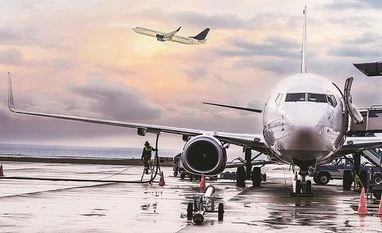The skies are far from clear for the Indian aviation sector as the Covid-19 pandemic continues to withhold airlines such as IndiGo and SpiceJet from flying. A recent government suggestion to begin operation between green zones has been shot down by the airlines, calling it commercially unviable. Amid this, US-based aircraft manufacturer Boeing has now said that air travel could take at least 3 years to recover to 2019 levels.
“Fundamental growth drivers remain intact but it will take 2-3 years for air travel to return to 2019 levels and a few more years to return to long-term growth trends,” Dave Calhoun, chief executive officer of Boeing recently said.
According to rating agency Crisil, the aviation industry will crash-land this fiscal with a revenue loss of Rs 24,000–25,000 crore with airlines contributing more than 70 per cent of the losses, or nearly Rs 17,000 crore.
“What’s worse, the losses will climb if travel restrictions last longer in hubs such as Mumbai, Delhi, Chennai and Kolkata. We expect the aviation sector will take at least 6-8 quarters to reach pre-pandemic levels,” it said in a recent report.
Given the nationwide lockdown – in place at least till May 17 -- and weak travel sentiment, global aviation consultancy CAPA, too, recently revised downwards estimates for India’s air traffic for the current financial year from 80 to 90 million domestic passengers to just 55-70 million, while international traffic could decline from 35-40 million to 20-27 million.
Crisil expects the Covid-19-led slowdown to reverse the growth trend of 11 per cent annum the industry has logged over the past ten years. Domestic air travel in the month of March declined 33 per cent month-on-month (MoM) to 7.76 million passengers from 11.59 million passengers in February, 2020, data provided by Directorate General for Civil Aviation (DGCA) shows.
How the lockdown is biting
The indefinite suspension of flights has not only dried the revenue for IndiGo and SpiceJet, it has also led to deferment of aircraft deliveries due to difficulty in lease payment.
According to analysts at HSBC, IndiGo is likely in discussion with its lessors to defer lease rentals by six months. However, lessors are allowing airlines to defer lease payments for about three months. Given this, the brokerage estimates that with a free cash reserve of Rs 9,400 crore, and restricted cash reserve of Rs 10,600 crore, IndiGo will likely burn nearly Rs 1,000 crore every month due to the grounding.
As for SpiceJet, the brokerage pegs the monthly spend at Rs 300 crore. As of September 2019, SpiceJet had cash balance of Rs 86.3 crore. It didn’t disclose its cash balance at the end of the December quarter.
In this backdrop of airlines deferring deliveries, Europe-based Airbus has said it will find the right balance between enforcing its rights over the pre-delivery payments (PDPs) given by the airlines and navigating the crisis together with them keeping long term interest in mind.
That apart, CAPA believes the Supreme Court’s decision on cash refunds would also have a bearing on the airlines going-ahead.
“If the Court’s ruling on passenger refund goes against airlines, as is likely, it could trigger the need to refund of nearly $300 million,” it said in its recent report.
A petition has been filed by NGO Pravasi Legal Cell urging the apex court that non-refund of the amount of the tickets by airlines – and providing a credit shell -- was in violation of the Civil Aviation Requirement issued by the DGCA.
Lastly, airline operators argue that resuming flight operations while maintaining social distancing would result in a capacity loss of 33 per cent as middle seats would have to be kept empty.
Amid the negatives, Airbus has said it is seeing some signs of recovery in China with passenger capacity recovering from of slump of 85 per cent in mid-February to 60 per cent in April.
Sector outlook and investment strategy
With the aircraft lessors likely to support the airlines through this crisis period, some relief could be on the cards, say analysts at Centrum Broking.
“With both, Boeing and Airbus, expecting the aircraft lessors to support the airlines through this crisis period, we see some relief being on the way for the Indian carriers in terms of deferment of lease payments,” says Ashish Shah, sector analyst at the brokerage. He pegs his hopes on compensation by Boeing with respect to its Max fleet to provide the necessary cash cushion to SpiceJet.
Shah has ‘buy’ call on IndiGo with a target price of Rs 1,340, while has ‘reduce’ rating on SpiceJet with a target price of Rs 33.
“We expect stock prices to remain highly volatile, and liquidity could overshadow profitability as the driver of stock prices,” wrote analysts at HSBC in their sector report. The brokerage has ‘Hold’ rating on both, IndiGo (target price: Rs 1,015) and SpiceJet (target price: Rs 44.5).
Enable GingerCannot connect to Ginger Check your internet connection
or reload the browserDisable in this text fieldEditEdit in GingerEdit in Ginger×
Unlock 30+ premium stories daily hand-picked by our editors, across devices on browser and app.
Pick your 5 favourite companies, get a daily email with all news updates on them.
Full access to our intuitive epaper - clip, save, share articles from any device; newspaper archives from 2006.
Preferential invites to Business Standard events.
Curated newsletters on markets, personal finance, policy & politics, start-ups, technology, and more.
)